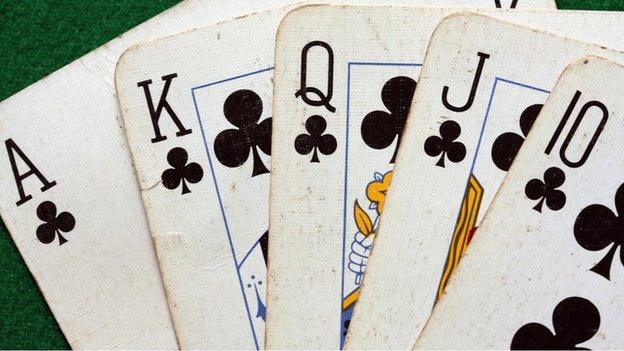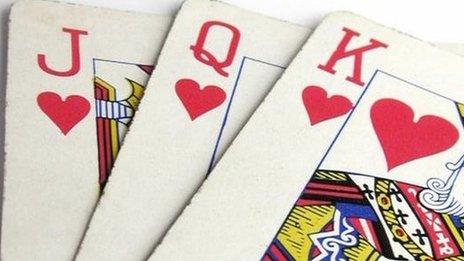Bridge 'more of a sport than shooting', High Court hears
- Published

Mr Justice Mostyn said the game could be said to be a legitimate sport under English law
The card game Bridge is "arguably" a sport and could qualify for lottery funding, a High Court judge has found.
Mr Justice Mostyn said the game could be said to be a legitimate sport under English law.
He has granted the Aylesbury-based English Bridge Union permission for a full judicial review of its status.
Sport England has refused to recognise the game and said it was no more a sporting activity than "sitting at home, reading a book".
Mr Justice Mostyn, who said he played Bridge on social occasions, heard a claim the game ought to be recognised as a "mind sport" that exercises the "brain muscle".
Kate Gallofent QC, for Sport England, said the definition of a qualifying sport was an "activity aimed at improving physical fitness and well being, forming social relations and gaining results in competition".
Mind sports recognised
That definition is based on a European Sports Charter promoting "a common European definition of sport".
However, the judge was told other EU countries, including the Netherlands, Ireland and Poland, "recognise Bridge as a sport".
Miss Gallofent insisted: "The starting point of the definition of sport is physical activity. Bridge cannot ever satisfy this definition."
Mr Justice Mostyn told her: "If the brain is a muscle, it does.
"You are doing more physical activity playing Bridge, with all that dealing and playing, than in rifle shooting.
"In 1999, the International Olympic Committee (IOC) recognised that Bridge and Chess should be recognised as mind sports."
The judge granted the union permission to mount a full judicial review challenge to Sport England.

Guide to Contract Bridge
Contract Bridge is a complex game played by millions of people across the world in competitions and at social events.
All the cards are dealt from a normal 52 card deck for each game.
Two players from each of two teams sit opposite each other across a table and through a bidding process (auction) agree to win a number of tricks.
Suits are ranked upwards - clubs, diamonds, hearts, spades and no trumps.
If they achieve the number of tricks agreed at auction they win the game but if not they lose.
The team with the highest number of games takes the rubber.
These are the simple basic rules. At higher levels, the game includes bonus points, complex dealing and other laws.

- Published25 February 2014
